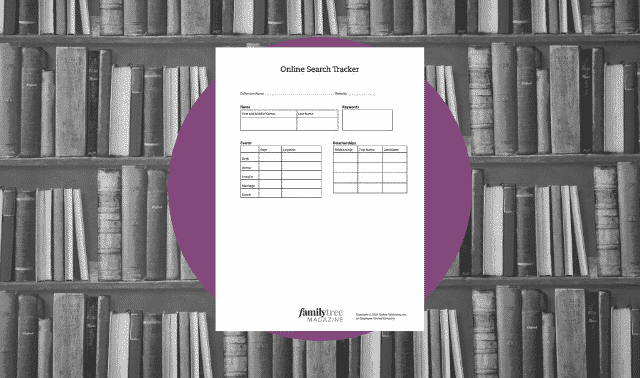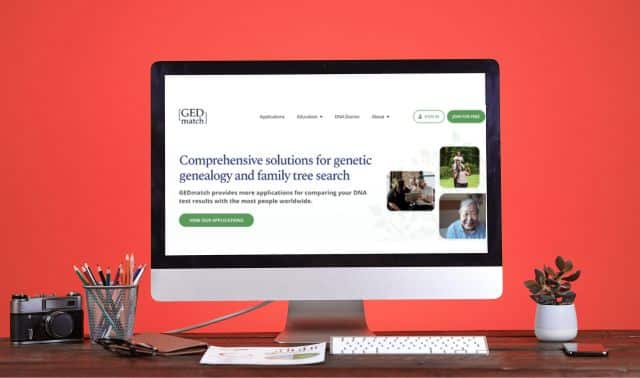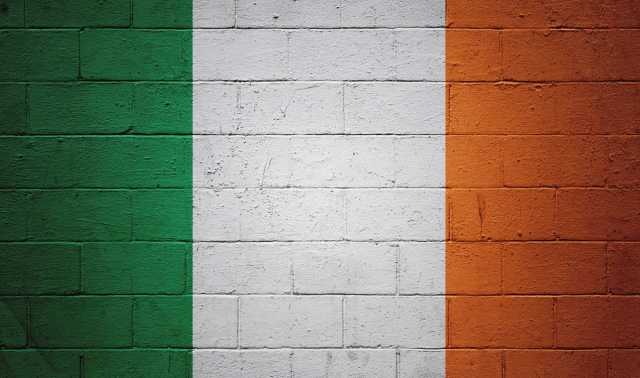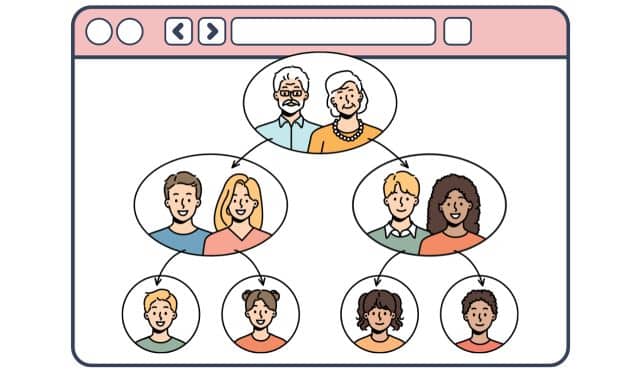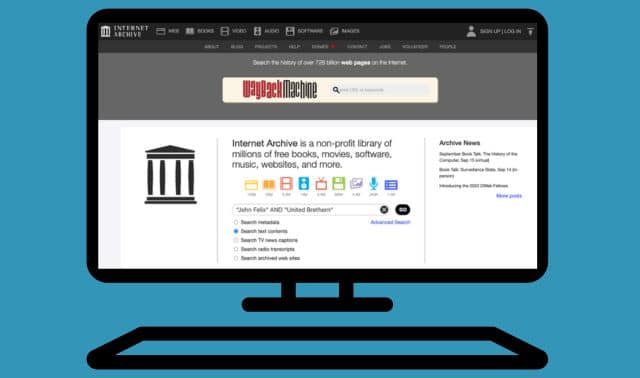Sign up for the Family Tree Newsletter! Plus, you’ll receive our 10 Essential Genealogy Research Forms PDF as a special thank you.
Get Your Free Genealogy Forms
"*" indicates required fields

If you’re tracing (or trying to trace) Irish ancestors, you may have heard that “all the records burned in the fire”—the 1922 Four Courts Fire at the Public Record Office in Dublin, an unfortunate event of the Irish Civil War.
But this is a myth that online Irish family history databases are working to shatter, and rightly so. While it’s true that a large chunk of Ireland’s genealogical heritage did go up in smoke that day—including many wills, legal court records, Church of Ireland parish records and national censuses from 1821 to 1851—many important collections survived. Modern-day Celtic creative thinking is helping to bridge some of the record gaps with an ever-increasing selection of online historical documents that hold clues to the lives of our Irish ancestors.
Undoubtedly, Irish genealogy will remain challenging for many researchers, especially for those whose immigrant ancestors didn’t leave behind readily discovered information about their origins in Ireland. But as these 11 top websites demonstrate, the opportunity to discover more about your Irish heritage has never been greater.
ADVERTISEMENT
1. Ancestry.com ($)
Beyond its US-focused collections, which may reveal details of your Irish immigrant ancestor’s journey, naturalization (if indeed he became a citizen) and life in North America, subscription site Ancestry.com has about 200 collections that pertain to Ireland (and require a World Explorer membership to access).
Ancestry.com has considerably fewer Irish records than Findmypast (see website No. 4). But it does hold several essential beginner record sets—censuses, civil registrations and Griffith’s Valuation—and a few less widely available resources such as Royal Irish Constabulary records (1816–1921) and Famine Relief Commission papers (1844–1847).
Some jewels in this site’s crown are indexed collections of more than 700,000 names in Roman Catholic parish registers. They consist of baptisms, marriages, burials and (very unusually) confirmations from dozens of parishes. The earliest records date from 1763.
ADVERTISEMENT
Many entries include a high-quality scanned image of the original register, while others return a transcription. Depending on the layout of some of the registers, you may need to click to the next page to see the names of sponsors (godparents).
2. AncestryIreland.com ($)
Not to be confused with the aforementioned Ancestry.com, AncestryIreland is the online home of the Ulster Historical Foundation (ULF), an educational charity from Belfast, as well as its membership arm, the Ulster Genealogical and Historical Guild.
As part of the Irish Family History Foundation’s network of island-wide genealogy centers, the ULF uploads its church and civil record transcriptions for counties Antrim and Down to the subscription-based RootsIreland database (see website No. 11), but these records are also accessible on AncestryIreland. The difference is that, though RootsIreland offers these and other records as part of a monthly subscription package, AncestryIreland offers them on a pay-per-view basis. Your most cost-effective option will depend on the geographical focus of your research and how much time you can dedicate to your ancestral hunt over a month.
Also depending on your particular research needs, you might consider membership in the guild. This opens up some 200 small- to medium-sized collections covering more of Ulster, many of them dating back to the 17th and 18th centuries.
Tip: Naturalization papers and records generated when a person died—obituaries, tombstones, burial records, funeral home records—can be especially helpful in determining an Irish ancestor’s place of origin.
3. FamilySearch
FamilySearch, the genealogical arm of the Church of Jesus Christ of Latter-day Saints, has an agreement with the National Archives of Ireland (NAI) that allows duplication of nearly all the NAI’s records. Note that some record images are hosted on other websites (such as NAI’s) or are only available to view at branch FamilySearch Centers.
For many researchers, the Irish pot of gold on FamilySearch is the collection of civil registration indexes covering 1845 to 1958, an essential Irish genealogy record set. It’s available elsewhere for a fee, sometimes with enhanced searching. But FamilySearch provides a useful free, basic version.
Researchers with ancestors from Northern Ireland are best off with the General Register Office of Northern Ireland’s (GRONI’s) free online search (see website No. 5), but for others, the FamilySearch version will remain the number-one option for finding vital records.
Other potentially useful collections are “Ireland Births and Baptisms, 1620–1881” and “Ireland Marriages, 1619–1898,” which, together, hold just over 4 million records. The coverage of these collections is a bit inconsistent, though, with some parishes and counties having extensive coverage, and others little. To better understand these limitations, navigate to the search page for each collection and click the “How to Use This Collection” link.
4. Findmypast ($)
Findmypast has the largest collection of Irish family history records online. The base Essential British & Irish subscription includes vital, parish and census records; an Ultimate subscription to the Findmypast site (or an Ireland-specific subscription via Findmypast.ie) includes a growing number of Irish newspaper titles dating back to the 1700s.
Among the gems to look for are Landed Estate Court Rentals, a collection much more interesting than its name might suggest: It often holds surprising details about land tenants. The Petty Sessions court registers, a collection of records 23 million strong, hold the stories of our ancestors’ sporadic misdemeanors and squabbles with neighbors. And then there are the esoteric dog licenses registers, which record 7 million names of people and an occasional furry friend. Beyond adding color to your knowledge of an ancestor’s life, these records can provide great clues to the ever-changing story of a family.
Not to be missed by anyone with roots in Ireland’s West Coast counties is “Poverty Relief Loans, 1821–1874.” These record small loans by local committees, which may have funded the purchase of a sheep or a ticket across the Atlantic.
If you’ve had trouble finding ancestors in the 1901 census on the National Archives of Ireland website (No. 8 in this listing), check out the Findmypast version. At Findmypast, you can search for more than one household member, by birth year, and by variants on the spelling of first and last names.
Watch for the site’s frequent promotional offers and free-access weekends. Or learn what you can do on the site for free.
5. General Register Office of Northern Ireland
In 2014, GRONI launched an online database of civil registration records for counties Antrim, Armagh, Down, Fermanagh, Londonderry and Tyrone. Its birth records date from 1864 to 100 years ago, marriages from as early as 1845 (depending on denomination) to 75 years ago, and deaths from 1864 to 50 years ago.
You must register before you start to explore the records. Although registration is free, watch out for the first quirk of the system: You must have at least one credit in your account in order to see search results (even free search results). One credit costs .5 pounds or about 60 cents.
Basic, free searches may satisfy your research needs. You only start paying if you select Enhanced View, which provides additional information transcribed from the original birth, marriage or death certificate, or if you choose Full Certificate View, which presents both a transcription and a digital image of the original certificate.
This is where the second quirk appears. Your search results remain in your account for only 72 hours. Be sure to take a screenshot of your records before you finish your research session.
Finally, if you have Northern Ireland ancestors, don’t miss the site’s useful and often-overlooked townland map.
6. Irish Ancestors
Irish Ancestors is Ireland’s longest-running established genealogy website. Once hosted on the Irish Times website, Irish Ancestors was founded and is managed by the renowned Irish genealogist John Grenham.
Unlike the other sites here, Irish Ancestors doesn’t hold any record collections. Instead, it provides masses of information and clear direction to those starting their Irish ancestry hunt. Some resources are behind a “soft” paywall, meaning you’ll need to subscribe to view more than five premium pages in a 24-hour period.
Behind the Browse link lies an online version of Grenham’s Tracing Your Irish Ancestors (Genealogical Publishing Co.; widely considered the Bible of Irish genealogy), a vast list of Irish genealogy links, detailed civil and Roman Catholic parish maps, step-by-step how-to advice, and an extensive collection of articles on Irish heritage and genealogy.
A free feature is the excellent Wizard. This tool analyses the details of what you already know about an ancestor and produces specific recommendations for further research.
Researchers also should search the Surnames database for free counts of households by county, a surname dictionary, surname histories and more.
7. IrishGenealogy.ie
This free database www.irishgenealogy.ie/en holds transcriptions of pre-20th century church records of baptisms, marriages and burials for selected Church of Ireland and Roman Catholic parishes in counties Kerry, Cork and Carlow and the city of Dublin, plus one Presbyterian register for Lucan in County Dublin. Some records date from the 17th and 18th centuries, with nearly all of the rest from the early 1800s and later. In some cases, you also can view images of the register page.
You’ll find a link to a list of parishes this collection includes on the Church Records page. For those with ancestors in this relatively small geographical area, IrishGenealogy.ie is invaluable: These indexed records aren’t online elsewhere.
The site also holds the only official version of Ireland’s civil registration indexes of births, marriages and deaths. (“Non-approved” versions, from FamilySearch microfilm taken during the 1960s, are available at other websites, including FamilySearch.) IrishGenealogy.ie’s civil registrations follow the 100-75-50-year privacy rule GRONI uses.
At first glance, this appears to offer less than the microfilm version. But this official collection is actually known as the “enhanced” version, because the General Register Office (GRO) staff who use it are adding details transcribed from original vital certificates. These details include mothers’ maiden names for births registered from 1900 to 1914 and some earlier ones. GRO staff also are “coupling” brides and grooms, so the spouse is shown in most marriage entries from 1903 to 1939. If you’re researching in the 20th century, these are great improvements.
8. The National Archives: Genealogy
The website of the National Archives of Ireland has been much-loved since the day in late 2007 when it launched the first lot of indexed 1911 census returns. Irish genealogy research turned a corner and has never looked back.
Years later, this site offers access to the complete 1901 and 1911 censuses; every single surviving scrap from earlier censuses; tithe applotment books dating from the 1820s and 1830s; Calendars of Wills and Administration (1858–1922); and a small, sad collection of wills written, often hurriedly, by soldiers departing to fight for the British Army in the Great War or in the Second Anglo-Boer War in South Africa.
All records here are free and link to images of the original material. They’re also available on FamilySearch or with a Findmypast subscription.
9. National Library of Ireland Roman Catholic Parish Registers
The National Library of Ireland (NLI) hosts a free online home for its collection of Ireland’s Roman Catholic parish registers. Dating from the 1740s to the 1880s, these registers cover more than 1,000 parishes and consist primarily of baptismal and marriage records.
The registers, scanned from microfilm, are browsable by parish location only. You won’t be able to directly search for a name, so the site won’t be of immediate help to those who don’t know where in Ireland their immigrant ancestors came from. But indexes from Ancestry.com and Findmypast can help. Users might also find it helpful to use the library’s site in conjunction with RootsIreland and Irish Ancestors; each parish’s landing page links to both.
For those who already can pinpoint a parish of origin, this website heralds a new era for Irish genealogy by making old church records for its majority religious group readily accessible. Information in the registers varies from parish to parish, but typically includes the dates of the events and the names of key people, including godparents or witnesses.
10. Public Record Office of Northern Ireland
While it doesn’t offer online access to census, vital or church records, the website of the Public Record Office of Northern Ireland (PRONI) is a top-drawer destination for family historians with connections to the six counties of Antrim, Armagh, Down, Fermanagh, Londonderry and Tyrone.
Exploration here is well rewarded with heaps of background information, an extensive range of downloadable family history guides, and several useful collections served up free of charge.
These collections, most of which link to images of the original material, are accessible from the home page (under Search Archives Online). They include will calendars (1858–1965), street directories (1819–1900), the Ulster Covenant (1912), Freeholders’ records (pre-1840), and Londonderry Corporation records (minutes, 1673–1901). The most popular collection is “Valuation Revision Books” (1830s–1933), which record Griffith’s Valuation changes in size, quality and value to all properties, both rural and urban, as well as the names of their occupiers and owners. Changes were recorded in different colors of ink, one color for each year, and can help to establish significant dates in a family’s history, such as dates of death, land sale or migration. Note that these revision books are often referred to as “cancelled books,” especially in the Republic of Ireland.
The PRONI site also offers a rather unassuming Name Search. Be sure to dip in. It allows you to search a number of indexes to pre-1858 wills, surviving fragments of the 1740 and 1766 religious censuses, and 1775 dissenters’ petitions.
11. RootsIreland.ie ($)
If ever a website demanded a researcher to draw breath and make its acquaintance before attempting to tease out its treasures, RootsIreland is it. The nonprofit Irish Family History Foundation (IFHF) manages this site and its database of 23 million transcriptions of records (not linked to images) held by the IFHF network of county and regional genealogy centres. The subscription site is best known for its church records of mixed denominations, but it also has transcribed birth, marriage and death certificates for some counties.
Before going anywhere near the search page, you’re best off reading the Help pages or at least looking for your ancestral counties on the list of available records. Some of the parish registers have significant gaps, so you really do need to check that records for the year, religion and parish or district you’re interested in are available.
Although transcriptions are still being added and are generally of a high standard, the bulk of the parish register transcriptions are of variable quality. Think creatively, especially with regard to the spelling of surnames, if you can’t find a record you believe should be available.
Last Updated: March 2024
Related Reads
ADVERTISEMENT

